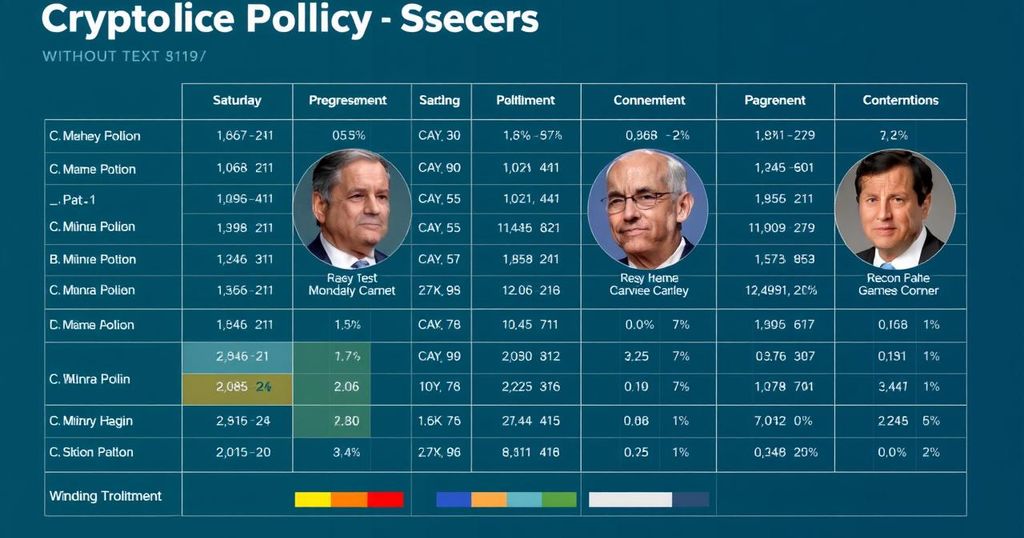Evaluating Cryptocurrency Policy Positions of Biden, Harris, and Trump
Alex Thorn of Galaxy Research has assessed the cryptocurrency policies of Joe Biden, Kamala Harris, and Donald Trump, suggesting that Biden’s administration may impose stricter regulations, whereas both Harris and Trump exhibit more supportive stances. Trump particularly proposes significant reforms aimed at favoring Bitcoin mining and reducing restrictions, while Harris aims to balance innovation with consumer protections.
Alex Thorn, the Head of Research at Galaxy Research, conducted a policy scorecard evaluating the positions of Joe Biden, Kamala Harris, and Donald Trump on significant cryptocurrency matters. This analysis, grounded in public statements and insights from campaign personnel, suggests that a victory for Harris would carry limited risk, while a Trump win could yield substantial benefits for the cryptocurrency market, particularly altcoins. Thorn pointed out that under the Biden administration, there has been consistent support for the SEC’s regulatory framework, with only tepid verbal support for market structure legislation. Biden’s administration proposed a substantial 30% tax on Bitcoin mining operations and scrutinized the industry’s energy consumption through various reports. Furthermore, banking regulatory authorities have been effectively discouraged from facilitating digital asset services, a strategy referred to as “Operation Chokepoint 2.0.” The Biden administration also constituted a working group focused on stablecoins, yet this framework primarily favors banks as the principal issuers. Conversely, Vice President Kamala Harris’s recent statements indicate a preference for advancing innovative technologies, including digital assets, while maintaining a focus on consumer protection. Although her position on Bitcoin mining appears more favorable compared to Biden’s, her commitment to “climate justice” may lead to regulatory measures impacting high energy-consuming activities, such as Bitcoin mining. Nonetheless, her affiliations with Silicon Valley and the similarities between Bitcoin mining and AI development suggest a potential easing of restrictions associated with “Operation Chokepoint 2.0.” Regarding stablecoin regulations, the Democratic approach, as influenced by Rep. Maxine Waters, generally positions large banks as the primary issuers, which Thorn views positively. In sharp contrast, Donald Trump has pledged to replace SEC Chair Gary Gensler with an individual who advocates for innovation in the cryptocurrency sector. Trump demonstrates strong support for Bitcoin miners, having met with industry leaders and endorsed fundraising initiatives on their behalf. His campaign message, “Bitcoin will be made in America,” symbolizes his belief in classifying Bitcoin mining as domestic manufacturing. Trump’s initial crypto policy declaration for the 2024 campaign is against Central Bank Digital Currencies (CBDCs) and proposes to dismantle “Operation Chokepoint 2.0.” He also plans to empower the Office of the Comptroller of the Currency (OCC) to enable banks to engage with blockchain technologies and sees potential in non-banks serving as stablecoin issuers, thereby extending beyond the traditional banking system. As the upcoming Benzinga Future of Digital Assets event on November 19 will follow the U.S. elections, topics surrounding cryptocurrency regulations and Bitcoin as an institutional asset class will be pivotal in discussions.
The relationship between cryptocurrency policy and political leadership has become increasingly significant, especially as various states and federal regulatory bodies navigate the rapidly evolving digital asset landscape. Prior research indicates that regulatory clarity can either hinder or promote the growth of digital currencies, making the views of political figures critical for industry stakeholders. Given the broad spectrum of regulatory approaches taken by different administrations, understanding the implications of potential election outcomes on cryptocurrency policies becomes essential for investors and technology advocates alike.
The analysis conducted by Alex Thorn highlights the divergent approaches of Joe Biden, Kamala Harris, and Donald Trump regarding cryptocurrency regulations. While Biden’s administration has imposed stringent measures that could stifle innovation, both Harris and Trump present more favorable or supportive perspectives toward the cryptocurrency sector. Harris’s approach seeks to balance innovation with consumer protection, while Trump advocates for a more permissive regulatory environment, promising to dismantle existing restrictions and promote domestic Bitcoin mining. The evolving political landscape will undoubtedly influence future cryptocurrency regulations, with significant implications for the digital asset market.
Original Source: www.benzinga.com







Post Comment